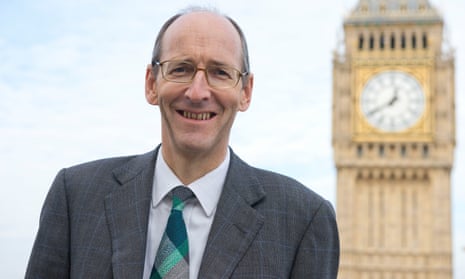Andrew Tyrie is “a man who would insult the Queen if he thought she deserved it,” the late Simon Hoggart wrote in this paper after the Conservative member for Chichester gave one of his characteristically acerbic performances in committee. The victim of that occasion was a hapless Lord Stevenson, who had failed to explain adequately how HBOS had sunk on his chairmanship. Tyrie called him “delusional” as well as “evasive, repetitive and unrealistic”.
After the catastrophe of the 2008 banking crash, such language was exactly what was required. Tyrie was a tenacious interrogator who believed in proper accountability in boardrooms. The insults only flowed when the witnesses had dug their own holes. Now he is leaving parliament, a surprise announcement that should depress anyone who has listened to hours of select committee hearings over the years.
As chair of the Treasury committee, and also the parliamentary commission on banking standards, Tyrie says he’s “done what I can to make a contribution, particularly in efforts to improve banking standards and to shape a more trusted and resilient financial sector”.
He’s achieved a lot. The Treasury committee’s backing for the ring-fencing legislation in the 2012 Banking Act was vital. It then acted as a strong safeguard against bankers’ many attempts to water down the implementation of rules. He also helped to improve scrutiny of the Bank of England, another shortcoming exposed by the crash. He’ll be missed, as many MPs agreed on Tuesday. He led the way in restoring the power of select committees, one of his pet causes.
The good news is that Tyrie remains “deeply committed to public service” and, at the age of 60, wants to contribute outside parliament. Put him on the court of the Bank of England, for starters. He knows more about governance and the inner workings of Threadneedle Street than most members of the governing body. And, after the Treasury committee’s central role in the recent downfall of deputy governor Charlotte Hogg, it would be classy move by the Bank.
Whitbread’s German venture needs time to bed in
Whitbread enjoyed “another year of strong growth,” declared chief executive Alison Brittain. Up to a point. It’s true there was nothing slow about the progress in revenues at Whitbread’s two big formats – Premier Inn’s turnover was 9% better and Costa Coffee’s almost 11%. It’s just that, as one goes down the profit and loss account, the numbers aren’t as sparkling as they used to be.
Profit before tax (£565m) and earnings per share improved by 6%, and the dividend was lifted similarly. Nobody is going to moan too much about 6%, but “strong growth” at Whitbread used to mean double digits. In terms of earnings and dividends, it has achieved that score every year in the past five until now. Two years ago it was close to 20%.
The pace of expansion becomes harder to sustain when the numbers get bigger, of course. It’s also the case that Brittain is conducting a necessary and expensive overhaul of back-office IT systems and suchlike to ensure Whitbread can handle its greater size. That strategy seems perfectly sensible – but it’s not designed for short-term excitement, especially in a “tougher consumer environment,” as the company described current conditions.
To judge by the 7% fall in share price, some investors are struggling to accept the new reality. They should be more patient. Forget about immediate prospects and concentrate on the tentative bet on Germany with Premier Inn. If it can crack the German market, after a flop in India, Whitbread will be back to the races – but it could take five years before progress can be judged.
Yahoo shows Mayer the door – and the money
Yahoo is a “company that changed the world” and “humanised and popularised the web, email and search, real-time media, and more,” declared chief executive Marissa Mayer when she signed the deal last year to sell the company’s operating assets to Verizon for $4.8bn. Yes, but Yahoo did all those things about a decade and a half ago. Then it was overtaken by Google, Facebook and others.
Mayer arrived on the scene in 2012 and her reign, like most of her immediate predecessors’, was about trying to recover former glories. She failed, as they did, and the sale to Verizon was almost an act of mercy. The fact that Mayer could now walk away with a $186m (£145m) payoff plus $200m of salary over five years is extraordinary. It’s the US, and it’s tech, but the sum is ridiculous. What on earth would the board have been prepared to pay for success?

